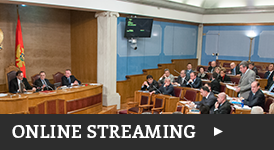The report is particular because it represents a comprehensive document, which, for the first time, summarises the work of a convocation of the Parliament and it was created with the aim to affirm and strengthen principles of transparency and publicity of parliamentary work.
One of the key characteristics of this Convocation, which is also clear from the Report, is an extremely dynamic legislative and scrutiny activity of the Parliament. In the period from April 2009 to November 2012, there were 63 ordinary and 14 extraordinary sittings of the Parliament, when the following had been adopted: 305 new laws, 156 laws on amendments to the laws, five constitutional laws and 235 other acts. Work on amending the Constitution began, and, among others, laws that fully regulate conducting of parliamentary investigation and performing parliamentary scrutiny in the field of security and defence had been adopted, and the obligation of harmonising the Law on Election of Councillors and Members of the Parliament with the Constitution had been fulfilled. Also, the scrutiny mechanisms of the Parliament had been additionally strengthened, and so there were 14 special sittings held in this period, dedicated to the Prime Minister Hour and Parliamentary Questions, when over 1,110 questions were posed to the President and the Members of the Government, and in 2002 the first parliamentary investigation was initiated.
During the 24th Convocation, the work focus was to a large extent transferred from Plenum to the working bodies, and so the intensity of their work had been greatly increased. There had been over 800 meetings of the working bodies held, when over 3,000 items of the agenda had been considered, and there had been organised a large number of control and consultation hearings, theme meetings, meetings outside of the building of the Parliament, visits to various institutions, public hearings, round tables, conferences and similar events.
The period of the 24th Convocation of the Parliament will also be remembered by significant events and activities in the field of integration of Montenegro to the EU. By obtaining the candidate status, and later also by adoption of the decision on opening of negotiations, there had been essentially a new stage opened in this process that sets out significantly more serious demands before all of the state bodies, including the Parliament of Montenegro. In that regard, a great deal of attention had been paid to harmonisation of Montenegro legislation with the EU legislation, but also to strengthening cooperation of the Parliament with the member states, as well as institutions of the EU, in particular the European Parliament, with which in 2010 the Parliament of Montenegro formed a joint body - Stabilisation and Association Parliamentary Committee (SAPC).
In order to provide a more quality support to MPs in performing their legislative and scrutiny functions, a number of novelties were introduced in the Parliamentary Service, and a great deal of attention was paid to development of human resources, i.e. professional development of the Parliament Service through various types of trainings. For the first time, the practice of planning the activities of the Parliament for each sitting and annual work plans for each working body were introduced, and adoption of implementation plans on sittings open to the public, 31 October was established as the Day of Parliamentarism in Montenegro, publishing of lists of votes in Plenary sittings was introduced, the licence for Eurovoc publications was given by the EU Office, etc.
The cooperation of the Parliament with the civil sector had been significantly promoted. In March 2011, the Memorandum on Cooperation of the Parliament of Montenegro and Network of NGOs for Democracy and Human Rights was signed, defining principles of cooperation with other interested NGOs, and also the attendance of civil sector representatives at the working bodies meetings had been increased.
Under the programme "Open Parliament", numerous visits and exhibits and also sittings of the Children Parliament had been organised, semi-annual and annual performance reports and monthly issues of the Bulletin "Open Parliament" had been published, and in October 2012, with the financial support by the ERSTE foundation of almost half a million euro, the project “Democratic Workshops” started, attended by more than 1300 elementary school students of Montenegro, while in 2013 this programme is to be attended by about 400 students. Also, the project of digitising legislative process with the support of the EU delegation to Montenegro had been launched.
Civil servants and state employees of all organisational units, in accordance with their competencies, participated in preparation of Performance Report of the 24th Convocation of the Parliament of Montenegro, and the additional information on the work of the Parliament is contained in the semi-annual and annual performance reports.The Parliament of Montenegro will also continue with the promotion of the model of informing the public on its activities during the 25th Convocation.









